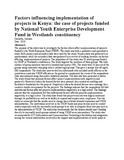| dc.contributor.author | Gachathi, Samson | |
| dc.date.accessioned | 2012-11-13T12:30:29Z | |
| dc.date.available | 2012-11-13T12:30:29Z | |
| dc.date.issued | 2010 | |
| dc.identifier.uri | http://erepository.uonbi.ac.ke:8080/handle/123456789/4057 | |
| dc.description.abstract | The purpose of the study was to investigate the factors which affect implementation of projects funded by the Youth Enterprise Fund (YEDF). The study was both a qualitative and quantitative study. Both primary and secondary data were used for the study. Primary data was gathered by a questionnaire while the secondary data was gathered by a review of existing literature on factors affecting implementation of projects. The population of this study was 79 youth groups funded by YEDF in Westland's constituency. The study targeted the members of these groups. The total number of group members was seven hundred and ninety (790).
The study took 10 percent of the groups using systematic sampling which yielded eight groups. This gave a sample size of eighty (80) respondents. The study also interviewed key informants who included youth officers in the constituency and also YEDF officials on the ground to complement the views of the respondents. Data was analyzed using descriptive statistical analysis. The data was then presented in tables.
The study found that personal factors affect project implementation both negatively and positively. Positively (when the desired factors were present) they created an enabling and facilitative foundation for the projects. Negatively (when the desired factors were missing) they created a hostile environment for the projects. The findings indicate that the respondents felt that institutional factors affected projects implementation negatively, to a high extent. The findings indicate that the respondents felt that institutional factors affected projects implementation negatively, to a high extent.
The study also found that projects success was largely measured through its profitability as well as its ability to expand and employ more employees. First the study recommends that the youths need to change their attitude towards businesses and YEDF administration. The institutions involved in the YEDF funds and projects also need to consult widely especially with the successful youth groups to be able to integrate these best practices in the administration of YEDF. The study also recommends that the donors should inject funding directly to successful youth groups instead of using YEDF as an intermediary. The study also recommends for ICT (Information and Communication Technology) facilitation and integration among the various stakeholders involved in the support and implementation of youth projects | en_US |
| dc.language.iso | en_US | en_US |
| dc.publisher | University of Nairobi, Kenya | en_US |
| dc.title | Factors influencing implementation of projects in Kenya: the case of projects funded by National Youth Enterprise Developement Fund in Westlands constituency | en_US |
| dc.title.alternative | Thesis (MA) | en_US |
| dc.type | Thesis | en_US |

